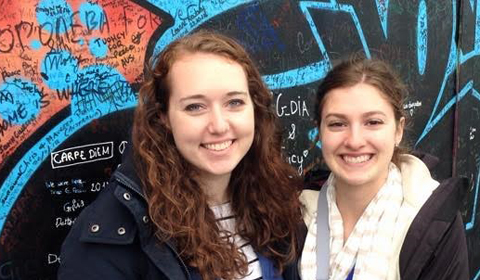
The M.A. in Law, Justice & Culture—which focuses on critical analysis of law in relation to society, culture, politics and power—is accepting applications through Nov. 15 for those interested in starting the online program in Spring 2020.
This master’s degree is designed for anyone who deals with law academically or professionally—including individuals in careers that deal with law, as well as those considering law school or Ph.D. programs.
The Law, Justice & Culture degree:
- Can be completed in person on campus or entirely online.
- Offers research-driven teaching by faculty with national and global expertise in their fields.
- Strengthens skills in analytical and conceptual thinking, legal and scholarly research and writing, ethical and public interest concerns, public advocacy, and active engagement with the challenges of law and justice in the 21st century.
Spring eCampus Courses
In spring 2020, the online eCampus core courses offerings are as follows:
LJC 6000: Proseminar in Law, Justice & Culture
The proseminar exposes students to law and society studies from an interdisciplinary perspective. Students learn the theoretical traditions of law and society scholarship through readings from different disciplines in the social sciences and humanities. The wide range of readings provides students with knowledge of varied approaches to the study of law while demonstrating a common appreciation of the mutually constitutive relation of law and society. (4 credits) — Taught by Professor Luis Plascencia
LJC 6800: Capstone in Law, Justice & Culture
This course systematically leads students through the process of independent empirical research. LJC 6800 culminates in a Master’s Research Essay to be evaluated by the faculty instructor in accordance with the program’s established evaluation rubric for major papers. (4 credits) – Taught by Professor Luis Plascencia
In spring 2020, the online eCampus elective course offerings are as follows:
LJC 6600x: Surveillance, Privacy & the Law
Surveillance, Privacy, and the Law explores the political, social, and legal dynamics of surveillance. We do this by studying surveillance associated with technologies and locations such as cell phones, social networking sites, electioneering, shopping, and the banking industry. The rapid expansion of surveillance technologies and capacities has not been without controversy, so we will also be studying the array of political, legal, and extra-legal areas of conflict over surveillance policy. The course mobilizes an interdisciplinary tool kit that includes materials from such areas as Law, Sociology, Political Science, Technology Studies, and a new field called Surveillance Studies. Finally, as explained below, the subject matter of this course is an opportunity to explore broad questions raised about how we best see, describe, and understand new and unprecedented phenomena. (4 credits) – Taught by Professor John Gilliom
ANTH 5530: Anthropology of Violence & Peace
This course focuses on the cultural dimensions of civil wars, ethnic and religious conflicts, communal violence, and state violence, as well as movements for human rights and peace. The course provide cross-cultural consideration of prevailing cultural forms and meanings of state violence, repression, and terror in the 20th and early 21st centuries. Topics include: colonialism and conquest; complicity and collaboration; the grey zone; totalitarianism; structural violence; transitional justice; memorialization; and truth telling. (4 credits) – Taught by Professor Duschinski
eCampus students are also invited to take courses on campus and to participate in the Spring Break Study Abroad Program on Human Right, Law & Justice in Northern Ireland.
How to Apply
Applicants need to have earned a bachelor’s degree, but no GRE is required.
Online Program | Deadline for Spring entry: Nov. 15, 2019
- Space available for online students in Spring 2020 and Fall 2020.
- Select MA4417 for the online option.
On-Campus Program | Priority deadline: Feb. 15, 2020
- Next on-campus cohort begins Fall 2020.
- After Feb. 15, applications for Fall 2020 will be reviewed on a rolling basis, as long as space is available in the class.
- Select MA4416 for the on-campus option.
About the M.A. in Law, Justice & Culture
“Law and society is a vibrant interdisciplinary field,” says M.A. Program Director Dr. Haley Duschinski, Associate Professor of Anthropology.
- Learn more about our recent graduates from the M.A. program in Law, Justice & Culture
- Learn more about Professor Luis Plascencia and his research on the U.S.-Mexico Borderlands
“As a law and society degree, the new M.A. program draws on the analytic, interpretive, and imaginative tools of the liberal arts to shed light on the moral and political elements on law, and its meaning and significance in our everyday lives.”
“This is important training for anyone who deals with law academically or professionally – including people who are in careers that deal with law, as well as those who are considering law school or Ph.D. programs.”
The M.A. program includes core courses focusing on the theoretical traditions of law and society scholarship and the deep integration of theory and methods in this interdisciplinary field, and well as elective courses examining law from different disciplinary perspectives.
The program also offers an annual nine-day study abroad program focusing on human rights, law and justice in post-conflict Northern Ireland. This study abroad experience includes interactions with former combatants, human rights lawyers, ex-political prisoners, victims associations, and restorative justice practitioners, as well as visits to museums, former prisons, and non-governmental organizations.
- Learn more about the CLJC study abroad program on Human Rights, Law and Justice in Northern Ireland.
The program emphasizes research-driven teaching and learning. All students must carry out graduate-level independent research by completing either a master’s thesis or a master’s research essay, with the option of a capstone research course.
The program also provides professional training in academic presentation and communication through its curricular and extra-curricular components.
The degree is housed within Ohio University’s Center for Law, Justice & Culture, an interdisciplinary teaching and research center focusing on law in relation to the social and political challenges of the 21st century.



















Comments